Michael Haag's Blog
December 17, 2019
The Making of a Virgin Birth
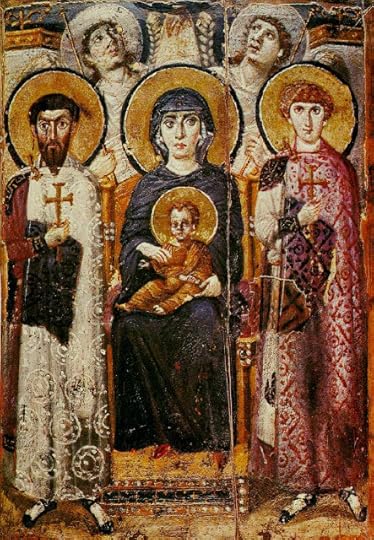 Mary as Theotokos 6th century St Catherine's monastery, Sinai
Mary as Theotokos 6th century St Catherine's monastery, SinaiFrom The Quest for Mary Magdalene by Michael Haag.
<br />
Published on December 17, 2019 09:53
November 30, 2019
Not in a Hurry
Published on November 30, 2019 12:18
October 31, 2019
Anne Farnol
Anne Farnol is a passing character in Constance, the central volume of Lawrence Durrell's Avignon Quintet. It is wartime, about 1940, in Cairo where Anne is a young officer in the Field Transport Corps. She appears in a brief vignette about four pages long (p.64ff) in which she and Blanford, a major character in the book, are drifting into an affair. One evening Blanford goes round to her flat; he says 'I would like to stay with you', and she says 'I hoped you would - I am so homesick, I sleep badly and this town makes me restless'. They make love, shuddering with pleasure, spending the whole night happily in each other's arms.
The next day Blanford is told that Anne is dead. Suicide. She had found out just before going to bed with Blanford that her husband who was in the Royal Navy was lost at sea.
'Anne Farnol!' says Blanford. 'The modest name vibrated on in my memory for whole months which succeeded her disapparance from the scene, from the war, from time.'
And that is that. You hear nothing more of Anne Farnol again. The reader is left suspended and unknowing just like Blanford.
I have wondered whether that story was based on anything in Durrell's life but I have drawn a blank. Just recently however I have come across the name again, the surname at least, Farnol, in Durrell's The Black Book written on Corfu 46 years before Constance. It is mentioned twice but just in a string of names; nothing identifies Farnol. Just 'a modest name' that may have meant something to Durrell at the time and which he tucked away in a drawer for future use,
The next day Blanford is told that Anne is dead. Suicide. She had found out just before going to bed with Blanford that her husband who was in the Royal Navy was lost at sea.
'Anne Farnol!' says Blanford. 'The modest name vibrated on in my memory for whole months which succeeded her disapparance from the scene, from the war, from time.'
And that is that. You hear nothing more of Anne Farnol again. The reader is left suspended and unknowing just like Blanford.
I have wondered whether that story was based on anything in Durrell's life but I have drawn a blank. Just recently however I have come across the name again, the surname at least, Farnol, in Durrell's The Black Book written on Corfu 46 years before Constance. It is mentioned twice but just in a string of names; nothing identifies Farnol. Just 'a modest name' that may have meant something to Durrell at the time and which he tucked away in a drawer for future use,
Published on October 31, 2019 06:20
September 20, 2019
Nanos Valaoritis
 Over the years I have done various posts concerning the outstanding and delightful Greek poet Nanos Valaoritis who died last Friday age 98. XAPA!
Over the years I have done various posts concerning the outstanding and delightful Greek poet Nanos Valaoritis who died last Friday age 98. XAPA!
Published on September 20, 2019 06:42
August 13, 2019
Three Caravan Cities
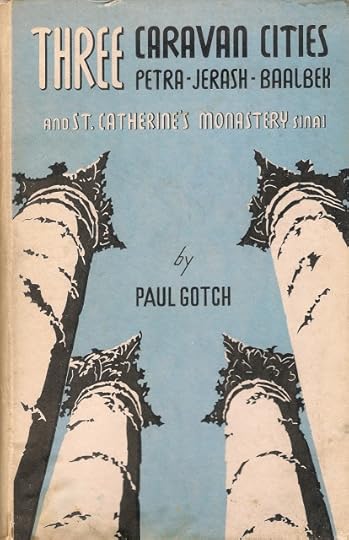 My copy of the 1945 edition.Three Caravan Cities - Petra - Jerash - Baalbek - and St Catherine's Monastery Sinai by Paul Gotch was published by Whitehead Morris in Alexandria in 1945. With photographs, maps and text it tells of journeys made during the war by Paul and his wife and friends. And it carries a brief introduction by Lawrence Durrell who with his girlfriend Eve Cohen shared the upper floor of the Villa Ambron in Alexandria with Paul and others working for the British Council.
My copy of the 1945 edition.Three Caravan Cities - Petra - Jerash - Baalbek - and St Catherine's Monastery Sinai by Paul Gotch was published by Whitehead Morris in Alexandria in 1945. With photographs, maps and text it tells of journeys made during the war by Paul and his wife and friends. And it carries a brief introduction by Lawrence Durrell who with his girlfriend Eve Cohen shared the upper floor of the Villa Ambron in Alexandria with Paul and others working for the British Council.Now Paul's son Adam Gotch has reproduced the original in an enlarged format and has added further photographs taken by Paul at the time. And other curiosities such as the letter reproduced here from the head of the British Council to Paul for going where it was thought he should not have gone.
For more information you can contact adamgotch@mac.com
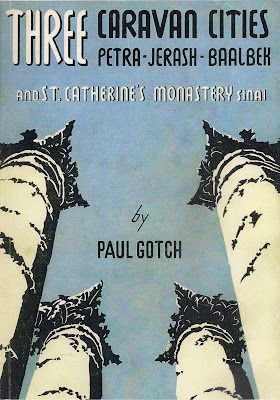 Adam's 2019 edition.
Adam's 2019 edition.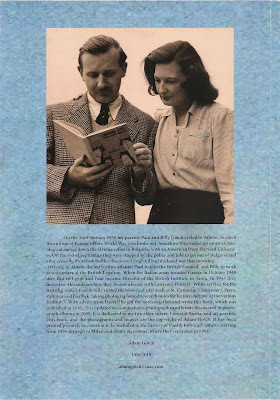 Paul and Billy Gotch.
Paul and Billy Gotch.

Published on August 13, 2019 13:01
July 9, 2019
Alexandria in Greek Memory
Published on July 09, 2019 04:36
June 19, 2019
Remembering Alexandria
 Maria and Rafaella
Maria and RafaellaSeven years ago I did a blog post on Alexandrian women. Now out of the blue I have received an email from the daughter, Sylvia Mikkelsen, of one of the women pictured in that post.
With Sylvia's permission I post her email here.
What a surprise to see my beautiful, young mother staring right back at me from your blog under the caption ‘Alexandrian Women.’ She is the one in white. I had been trying to read up on the Aleksandrinke and there you were, both of you! I knew you, of course, through your wonderful Alexandria: City of Memory, a book I had bought years back when Louisa, my grandchild, was born. I knew that the day would come when she would be asking questions about whether I was Egyptian, being born in Alexandria, or why in the world would her great grandmother come from Slovenia (of all places), and her great grandfather from the Levant – and where was that, anyway?? Oh, we still say the Levant because if we say Lebanese, there are other connotations today – and why do you speak English and French? – well, my father decided I should have an English education and my sister a French one, and Christian Lebanese people speak mostly French, etc. etc. There would be a lot of oral tales about my background, naturally. Yet, your book would give her all the necessary cultural and historical background as well as your great insight into the strange and mysterious world that was our Alexandria, a place that only exists in the memory of people who lived there. Not to mention the enriching literary parts concerning Durrell and Forster! She is today sixteen, and is the spitting image of my mother, Rafaella. She looks very often in your book, where I point out on the map the different tram stations on this narrow strip of land where we lived so well, between the marshes and the Mediterranean.
A propos the photo, Rafaella is together with her sister, Maria (in the dark dress). It is a strange photo, or part of a photo where there were two other Slovene girls together with them, if I remember correctly. It reflects the two extremes in the lot that awaited most of these girls in their fatidic journey to Alexandria. Maria arrived a few years before her younger sister to earn some money to send back to Gradisce – a village at the foot of the Carso hills, a few kilometers from Gorizia – where she had left a husband, two children, only to come back home years later, after the war, to be abused and insulted by her husband who called her the Alexandrian whore. My mother, on the other hand, found her husband almost immediately. She was barely eighteen and worked as a governess for the Ada’s only child, a girl who adored my mother for years and years to come (we, her daughters, were quite jealous of this relationship!). The Ada were a wealthy Jewish family who treated Rafaella as a daughter. Their neighbour, a Lebanese young man of a bit less than twice her age, observed her from his balcony and fell madly in love with her. He was to be our father. They had a happy marriage and my father and mother are buried in the beautiful cemetery in my mother’s village. With Nasser, they left Alexandria, first to Lebanon, later to Switzerland, and finally to Slovenia where they spent their summers, and shared their winters between Denmark, at my place, and Geneva, my sister’s.
Et voilà, the story behind the girls, one in dark and the other in white.I am sorry for this long-winded mail but that is how Alexandrians are, n’est-ce pas?
Oh, I have almost forgotten. I have a story to tell but do you think it would be worthwhile? Rafaella’s first cousin, Elda, was a governess – not to a child – but to none other than Lee Miller who was for a short period of time Aziz Eloui Bey’s second wife. After Lee deserted Eloui (there are several versions of who left whom), Elda - who was also my godmother - married Aziz Eloui, like a true Jane Eyre. We were very close as a family and we had great times, especially at Gharbaniat where Uncle Aziz had one of these fortress-like mansions in the desert. Anyway, practically on her deathbed, years later while she was living in a lovely pink villa close to Trieste, she finally opened up and talked about the long-lasting effects of having interacted with a beauty and personality as wild as Lee Miller’s. If I ever venture to write in the genre of a personal essay, perhaps, or anything you would advise me to do, would you kindly read it? It would be the story of the paradoxical effects Lee Miller had upon the governess, a prudish, Catholic, Slovene country-girl, emotions that fluctuated between sheer horror and unconditional adoration. The Alexandrian Governess would be a cross between Jane Eyre, and Daphne du Maurier’s Mrs Danvers. Actually, it seems that du Maurier’s inspiration for Rebecca arose from her years spent in Alexandria (which she intensely disliked) while her husband was stationed there as a marine officer.
I do not know why we, Alexandrians, always have the dream to write, but we do. Probably because we lived in a time warp, and we still cannot come to terms with it.
Published on June 19, 2019 11:34
May 13, 2019
What the Durrells Did Next
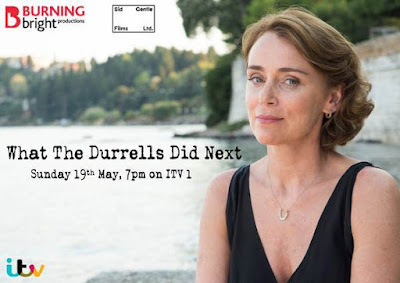 You can also find out what the Durrells did next by reading this book.
You can also find out what the Durrells did next by reading this book.
Published on May 13, 2019 14:03
May 10, 2019
End of the Durrells' Corfu Idyll
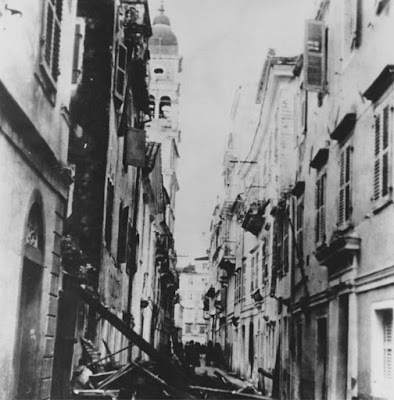 Corfu town bombed by the Italians in 1941.The Mirror has run a story on the terrible end of the Durrells' Corfu idyll when the island was devastated by war and some of the family fled for their lives.
Corfu town bombed by the Italians in 1941.The Mirror has run a story on the terrible end of the Durrells' Corfu idyll when the island was devastated by war and some of the family fled for their lives.
Published on May 10, 2019 16:00
May 4, 2019
Fascists in Corfu
 Corfu fascist parade 1933.The Durrells went to Corfu in 1935, where they seemed able to ignore the darkening political situation in Europe. But judging from this photograph there was already a fascist movement in Corfu two years before the Durrell family arrived.
Corfu fascist parade 1933.The Durrells went to Corfu in 1935, where they seemed able to ignore the darkening political situation in Europe. But judging from this photograph there was already a fascist movement in Corfu two years before the Durrell family arrived.What I do not know is to what extent this was an indigenous Greek movement or a purely Italian-Corfiot one. Corfu was long ruled by Venice and Italian influence remained strong. Italian was the lingua franca of Corfu well into the nineteenth century and the island had an Italian community right up to the Second World War. Mussolini used this historical connection to twice justify his occupation of Corfu, once briefly in 1923, again in 1941.
Certainly Corfiots courageously protested against the second occupation, a rare thing in Europe at the time, and the island provided the beginnings of the Greek resistance against the 1941-1945 Italian and German occupations of Greece.
Published on May 04, 2019 12:32
Michael Haag's Blog
- Michael Haag's profile
- 65 followers
Michael Haag isn't a Goodreads Author
(yet),
but they
do have a blog,
so here are some recent posts imported from
their feed.





